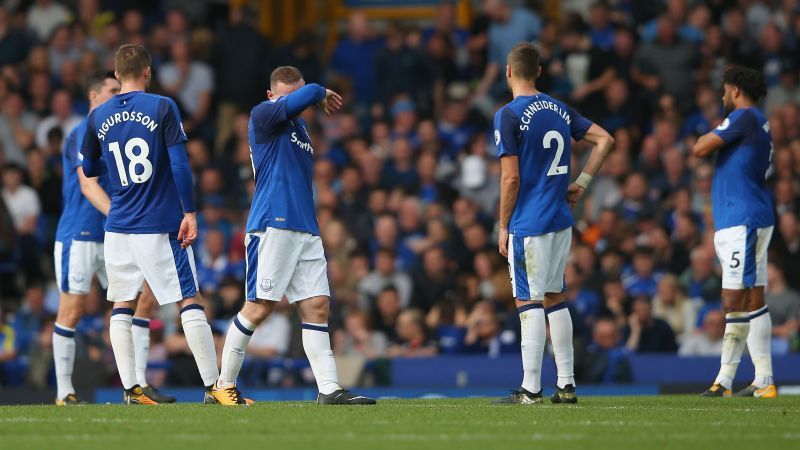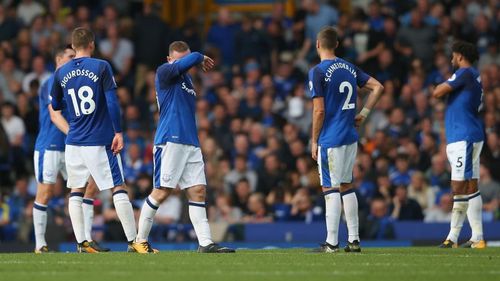
Everton's recent collapses show that they are still a long way from Europe's elite

Amidst all the transfer frenzy in England over the summer, it was surprisingly the blue half of Liverpool that outshone their cross-city rivals, spending close to 150 million in a crazy transfer window. If it hadn't been for PSG, Everton would probably be capturing all the headlines this summer.
For the Toffees, it has always been the case of an unfulfilled promise. They enjoyed their periods of dominance in the mid-eighties when they jostled for domestic supremacy with Liverpool under English manager Howard Kendall. But since the advent of the Premier League era, they have been one of those teams ever-present in the upper echelons of English football, but rarely ever in the company of Europe's elite.
With the English top flight being at its most competitive in several years, there are two philosophies which clubs adopt to challenge for the title. For the most part, teams like Chelsea, Arsenal and the Manchester giants have chosen to flex their financial muscles, investing heavily in the transfer market, continuously attracting the best talents from across Europe to England. But clubs like Tottenham who lack financial prowess choose to take a more balanced approach.
Better policies?
Spurs turned their fortunes around when they appointed Southampton manager Mauricio Pochettino in 2014. The Argentine boss, knowing fully well the financial constraints he would have to work with, chose to invest more on scouting networks and youth policies, a move that has seen Tottenham pull off some incredible bargains in the transfer windows, as well as several youth players being promoted to the first team.
Christian Eriksen, Dele Alli, Victor Wanyama and Eric Dier were all incredible bargains that Pochettino pulled off. Harry Kane has probably been the best player to emerge from their academy in several years, and also the best English striker of the current generation. It is no coincidence that the English national team's core came to be filled up by Tottenham stars at the same time that the North England club experienced their ascendancy.
Pochettino brought with him his own set of philosophies, both in terms of tactics and management, that has seen Spurs finish third and second in successive seasons. When they beat Dortmund 3-1 at Wembley this week, it announced their arrival on the biggest stage of European football. It has taken some time, but they can finally count themselves to be among the best clubs in England.
Everton, for all their ambitions, have failed to live up to expectations after the departure of Moyes. Roberto Martinez came with the promise of success, having won the FA Cup with Wigan Athletic, but was sacked in May 2016, having failed both domestically and in the Europa League. Everton then signed Ronald Koeman, Pochettino's successor at Southampton. The Barcelona legend did a decent job last season when Everton finished 7th, qualifying for the Europa League thanks to Manchester United's automatic Champions League qualification.
But this season, expectations will be higher. Only City, United and Chelsea spent more than them in the summer transfer window, thanks to the infusion of cash by British investor Farhad Moshiri. Koeman was shrewd in his negotiations and wrapped up all the incoming transfers well before deadline day, with the exception of Nikola Vlasic. They reinforced almost each and every position, to the extent that they could almost field a starting lineup of new signings.
Jordan Pickford became the second most expensive goalkeeper in history, which raised some eyebrows, given that he isn't even first choice for England yet. Davy Klaassen, Michael Keane, Gylfi Sigurdsson and Pickford all cost upwards of 20 million pounds. Sandro Ramirez joined from Malaga and Nigerian winger Henry Onyekuru from KAS Eupen, apart from Cuco Martina on a free from Southampton. But what captured the most attention was Romelu Lukaku's exit, and Wayne Rooney's move in the opposite direction from Old Trafford to Goodison Park.
Rough tides
The prodigal son's homecoming was met with a lot of hype and excitement by the Toffees. The Manchester United legend who left as a budding young teenager returned to Everton as the top scorer of his country and former club, a player spoken of in the same breath as United greats like Sir Bobby Charlton. His recent decline notwithstanding, his return to the club seemed to be a sign that they were finally ready to compete with the best of the best.
But their recent performances are contrary to those expectations. To be fair to them, they have had a nightmarish fixture list to start the season with, facing Manchester City, Chelsea and Tottenham in successive matchweeks, and are set to face Manchester United this weekend. Wayne Rooney scored on his first competitive match back at Everton in a straightforward 1-0 win against Stoke at home. A 1-1 draw with City was followed by 2-0 and 3-0 defeats to Chelsea and Tottenham.
While their fixture lists might be partially responsible for their Premier League struggles, there can be no excuse for their shocking collapse in Italy against Atalanta. The Italian side finished a respectable fourth in Serie A, above the likes of Lazio and AC Milan, but Everton are clearly the more talented side, and should have ideally had no problems in dealing with them. But the 3-0 defeat that has left them at the bottom of Group E showed that Koeman still has plenty left to do to repair a fractured team low on confidence and spirits.
Clearly, the money spending approach hasn't helped them. What Everton need right now is their own set of unique principles and philosophies, much like what Tottenham have achieved over the past two years. All of Everton's big money signings have struggled to gel together in a team that has changed drastically over the last year. That is probably Koeman's biggest mistake so far - expecting the team to perform like a well-oiled unit in spite of having several newcomers.
You might argue that the other English teams have done the same, but no one has had as many new signings as Everton. United have signed only three players, meaning that the starting XI from last season has barely changed. While City made several new signings, Guardiola has chosen to integrate them slowly into the first team, keeping his starting lineup mostly intact. The fact is, these teams already had a successful formula from last season that they simply carried over to this year, signing only the players that they needed, for the positions in which they were the weakest.
Everton don't have the luxury of a winning formula, which leaves Koeman no chance but to experiment with new signings and tactics. They cannot hope to achieve the levels of consistency of the other big clubs in the space of a single season. Ronald Koeman certainly has the talent and vision to lead them for a long time to come, as he proved with Southampton. But the board should give him the time and freedom he needs to infuse his own methodologies into the team.
The road ahead for the Merseyside team is a long and hard one, but if anyone can lead them through it, it is Ronald Koeman.